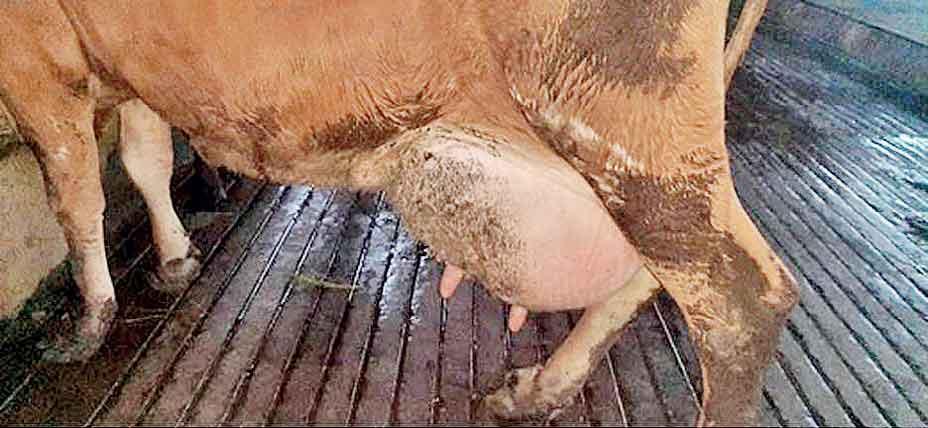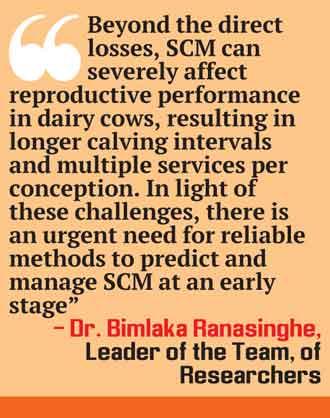22 Oct 2024 - {{hitsCtrl.values.hits}}

In countries like Sri Lanka, prevalence of ‘Mastitis’ is exacerbated by a lack of effective disease surveillance
|
One of the primary challenges to increase local milk production is the high prevalence of diseases among lactating cows In countries like Sri Lanka, prevalence of ‘Mastitis’ is exacerbated by a lack of effective disease surveillance |
By L.B.Senaratne
 University of Peradeniya has become a centre of research, thanks to all efforts taken by former Vice Chancellor Prof. M.D.Lamawansa to continually promote this academic institute. And since then the university has continued to blossom in research activity.
University of Peradeniya has become a centre of research, thanks to all efforts taken by former Vice Chancellor Prof. M.D.Lamawansa to continually promote this academic institute. And since then the university has continued to blossom in research activity.
A Team of Researchers from the Faculty of Veterinary Medicine and animal Science led by Dr. Bimalka Ranasinhe have established a branch for Artificial Intelligence to help the farmers of Dairies. These efforts are taken to produce more milk than the usual forty percent production achieved in this country. Whenever dairy products are imported it drains the country’s foreign exchange.
Sri Lanka meets only about forty per cent of its national milk demand through domestic production. The remainder is imported at a significant cost and foreign exchange is used for that. One of the primary challenges to increase local milk production is the high prevalence of diseases among lactating cows. “Mastitis” is a common disease in dairy cows, causing inflammation in the mammary gland and leading to the production of abnormal milk. While the visible signs of mastitis are easier to spot, a hidden form called “subclinical mastitis” (SCM) often goes unnoticed. This can have serious impacts on dairy farms and the quantity and quality of milk produced, according to the Leader of the Team, of Researchers Dr. Bimlaka Ranasinghe.
In countries like Sri Lanka, prevalence of ‘Mastitis’ is exacerbated by a lack of effective disease surveillance, inadequate control practices, and treatment failures due to drug-resistant bacteria. The economic toll of SCM is immense, ranging from reduced milk production and poor milk quality to increased treatment costs and labour. “Beyond the direct losses, SCM can severely affect reproductive performance in dairy cows, resulting in longer calving intervals and multiple services per conception. In light of these challenges, there is an urgent need for reliable methods to predict and manage SCM at an early stage. “Developing advanced diagnostic tools is key to protecting herd health and improving productivity in the dairy sector, especially for a country like Sri Lanka,” said Dr. Ranasignhe.
In response to this, this Team of Research scientists of the University of Peradeniya explored the illness using Machine Learning (ML), a branch of artificial intelligence, to predict the incidence of SCM and provide farmers with a tool for early detection and intervention. “Machine Learning” is revolutionising various industries, including agriculture. Machine Learning refers to the ability of computers to learn from data and perform tasks without being explicitly programmed with specific instructions. Instead of following pre-defined rules, ML systems recognise patterns and make predictions based on past experiences, making them especially useful for complex problems where traditional algorithms fall short, according to Dr. Ranasinghe.
While ML-based tools have been successful in other parts of the world, there has been little or no research conducted using data specifically applicable to Sri Lankan dairy herds. Given the unique farming conditions and challenges in Sri Lanka, developing a tailored ML model is crucial for early detection of SCM and improving dairy farm productivity in the country. This research was carried out as a collaborative work among the Department of Basic Veterinary Sciences of the Faculty of Veterinary Medicine and Animal Science, Departments of Computer Engineering and Engineering Mathematics of Faculty of Engineering and the Department of Animal Science of the Faculty of Agriculture at University of Peradeniya.
This project was funded by a multidisciplinary research grant, from the University Research Council of University of Peradeniya.
Damayanthi Herath a Co-Researcher said: “This study focused on developing a tool to predict sub-clinical mastitis in dairy cows using machine learning based on individual cow data, such as breed, lactation history, and milk production details (like daily milkyield and milk composition, including fat, protein, and lactose). We experimented with different methods to see which one is most effective in predicting sub-clinical mastitis in cows. One method used all the data collected, while another focused only on the most important details to make it easier for farmers. Lastly, the most effective model to predict SCM was integrated with a user-friendly software tool that allows farmers to input data and get insights on herd health. The developed tool has features like batch data input, secure data handling, and easy-to-read visual reports, helping farmers make better decisions for their cows’ health ultimately improving herd health and productivity.
23 Dec 2024 7 hours ago
23 Dec 2024 8 hours ago
23 Dec 2024 23 Dec 2024
23 Dec 2024 23 Dec 2024